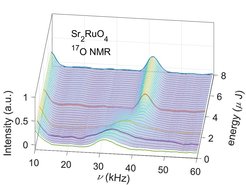Rewriting the story of unconventional superconductivity of Sr2RuO4: twenty year old result overturned
The phenomenon of superconductivity is one of the most fascinating properties of electrons in solids. At low temperatures the electrons co-operate so strongly that they are able to move around without dissipating energy, behavior which is a clear manifestation of the laws of quantum physics. Although we understand a great deal about superconductivity, many open questions remain, and it is still the subject of intense global research.
Among known superconductors, the material Sr2RuO4 is one of the most important. Its superconductivity is remarkably fragile to imperfections in the crystal lattice, so it is the cleanest superconductor yet discovered. It also has exotic but well understood metallic properties, providing a solid foundation for understanding its superconductivity in real depth. If this can be achieved, it will be a major breakthrough in the field.
However, the problem of Sr2RuO4 superconductivity has proven to be tougher to solve than had been hoped or imagined. A central difficulty was inconsistency of experimental information. High resolution experiments performed on extremely high quality crystals yielded results that seemed to be in contradiction with each other. Now, work from a collaboration between members of our Institute and the group of Prof. Stuart Brown at UCLA has solved one of these puzzles. For over twenty years it was believed that the magnetic response of the electron spins remained unchanged by the formation of the superconductivity in Sr2RuO4. This observation placed very strong restrictions on the kind of exotic superconductivity that it must host. The new experiments show that, in fact, the magnetic response changes considerably as the superconductivity develops, and identify the technical problem with the famous work from two decades ago.
Excitingly, these new experimental results throw the field of Sr2RuO4 superconductivity wide open. Ideas that had seemed to be ruled out need to be re-examined, and a whole range of new possibilities exist. The next few years promise to be very interesting indeed.

Andy Mackenzie / APM












